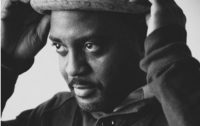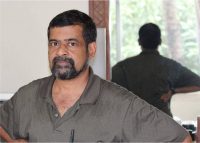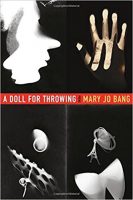August 17, 2017
Edited by David Sanders
Specimen Days
1841—Luis NF Varela, Brazilian romantic poet, is born.
1894—Erik A Blomberg, Swedish art historian/poet/author (Jorden), is born.
1896—Henry P de Vries, Dutch painter/poet (Laws of the Americas), is born.
1924—John A Emmens, art historian/poet (Kunst & Vliegwerk), is born.
1930—Ted Hughes, Poet (British Poet Laureate 1984-98), born in Mytholmroyd, Yorkshire (d. 1998), is born.
1973—Conrad Aiken, US poet (Pulitzer), dies at 74.
1987—Charles Drummond de Andrade, Brazilian poet, dies at 84.
Such unearthly airs
The ear hears, and withers!
In the revolving ballroom of space
Bowed over the moor, a bright face
Draws out of telegraph wires the tones
That empty human bones.
—from “Telegraph Wires” by Ted Hughes
Luis NF Varela, Brazilian romantic poet, was born this week in 1841.
World Poetry
Viral Poem Propelled Career of Poet Maggie Smith

Sometimes fame comes when you least expect it. It happened to poet Maggie Smith after "Good Bones" was published online in June 2016, the same week as a deadly nightclub shooting in Orlando and the assassination of an anti-Brexit leader in London. Smith's 17 lines of poetry on the beauty and ugliness of the world, and how to protect children from the worst of it, touched a chord with people and quickly went viral. Ohio State University, where Smith earned an MFA and later taught, estimated nearly 1 million people saw it. "It was insane, really the most surprising thing that has ever happened to me," Smith said in an interview from her home in Bexley, Ohio. "I still don't think I have processed it."
A 'gurt' Plan: National Poetry Day to Celebrate England's Local Words

From the Berkshire term for a woodlouse, “cheeselog”, to a Suffolk phrase for lopsided, “on the huh”, England’s poets are set to do their bit for preserving regional dialects, with a series of poems celebrating local words. The initiative to “shine a light into a lexicon that’s too often overlooked”, as the lexicographer Susie Dent described it, stems from the #freetheword project, a partnership between BBC English Regions, National Poetry Day and the Oxford English Dictionary to find unrecorded words used in everyday speech all around the UK.
Young people’s laureate for London, Caleb Femi, wrote a poem celebrating the city’s “fam.”
Recent Reviews
Marianne Moore’s Poetry, the Way She Intended It
by Stephen Burt
Modern poets who agreed on nothing else agreed on Marianne Moore. T. S. Eliot called her work “part of the small body of durable poetry written in our time”; William Carlos Williams, who hated Eliot’s taste, wrote that Moore “never disappointed me.” Elizabeth Bishop found in Moore her best, in some ways her only, model and mentor; Wallace Stevens admired her “scrupulous … unaffected, witty, colloquial sort of spirit.”
Deep Dives Into How Poetry Works (and Why You Should Care)
by Craig Morgan Teicher
Poetry is a bit like Dungeons & Dragons, scuba diving or gardening in that its adherents love nothing more than geeking out over its rules, necessary gear and best practices. To the uninitiated, these conversations might sound like a cacophony of meaningless jargon. But poets aren’t talking about unearthed arcana, buoyancy compensators or controversies over Roundup. When poets jabber about clerihews, tetrameter and negative capability, they’re exchanging trade secrets about the most definitive and common of human paraphernalia: emotion, thought and, perhaps, the soul itself, things everybody can relate to. Two of our best and most famous poets, Robert Hass and Louise Glück, both former United States poets laureate, have new books of prose that delve deeply into the esoterica of the poetic craft, which, for some, will be as necessary as a diving regulator.
Frank Bidart's Mirror
by Heather Treseler
Searching for a metaphysic in a fallen, libidinal world, Frank Bidart has, by necessity, made one. His oeuvre, ten books now gathered in one 718-page volume, provides an incisive index of the latter half of the twentieth century, a startlingly truthful mirror of its myths and multiplicities. His characters—dramatic personae, epic subjects, and lyric I’s—live hard up against the realities of empire and domination; the ligatures of filial piety, queerness, and modern marriage; the scandal machines of politics and religion; and the inescapable cruxes of desire.
Stephen Burt reviewed Marianne Moore’s “New Collected Poems” in the New York Times.
Broadsides
How Does Robert Pinsky Pen A Protest Poem?
by Talya Zax
Former Poet Laureate Robert Pinsky’s poem “Exile and Lightning” made an impact when he read it at a PEN America Writers Resist event in January. In front of a crowd that included cultural figures like Masha Gessen, Art Spiegelman, and Amy Goodman, Pinsky issued a striking reflection on the contemporary urgency of historic thought. “Now, fellow-descendants, we endure a/Moment of charismatic indecency/And sanctimonious greed. Falsehood/Beyond shame. Our Polish Grandfather/Milosz and African American Grandmother Brooks/Endured worse than this./Fight first, then fiddle she wrote,” he declared in the second stanza.
On Nanni Balestrini, the Most Radically Formalist Poet of the Italian Scene
by Franco “Bifo” Berardi

In the late 70s, Nanni Balestrini conceived the idea of a musical poem in collaboration with Demetrio Stratos, the singer of Area, whose exceptional voice was part of the Italian rebel movement’s sound. Then Demetrio died, while Balestrini was forced to exile in France. It was 1979, when the Italian State banned, arrested, and persecuted a group of intellectuals, workers, and activists known as Potere Operaio (Worker’s Power). The poet was one of them.
Nothing Will Ever Be Enough
Dwayne Betts did everything right, and then some. So why can’t he practice law?
by Nathan J. Robinson

Former prisoners do not get much more “rehabilitated” than Reginald Dwayne Betts. In the time since his release in 2005, Betts has published two acclaimed books of poetry and a memoir, earned a college degree with a 4.0, earned an MFA, started a family, held a Radcliffe Fellowship at Harvard, earned a law degree from Yale, received an NAACP Image Award, given talks at schools, prisons, and conferences around the country, been accepted to a PhD program, worked for the New Haven Public Defender’s Office, and passed the Connecticut Bar Exam.
Nanni Balestrini is the most radically formalist poet on the Italian scene.
Drafts & Fragments
30 Poetry Collections By Women That Will Keep You Motivated To Resist
by E. Ce Miller
In the months since Donald Trump has become president, more and more people have become inspired to join the Resistance. Bustle's 31 Days of Reading Resistance takes a look at the role of literature and writing in the Resistance, both as a source of inspiration and as a tool for action. Over six months out from this year’s epic Women’s March on Washington (and other sister marches that took place all over the United States and the world) women’s leadership in the resistance is as important as it’s ever been. But while all those woman-power vibes probably stayed with you for weeks after the march, without regular support from your sisters-in-protest it can be hard to always stay motivated to resist. (Especially when the headlines grow more unbelievable and government leadership increasingly dangerous, by the day.) And that’s why you should check out these poetry collections written by women — perfect for keeping you inspired, motivated, empowered, and resisting, no matter what craziness Washington might throw your way.
Bustle has curated a list of 30 poetry collections by women that use poetry as a tool for action.
Poetry In the News
Criminal and Human Rights Lawyer Fined $6,000 for a Poem on Death Penalty that “Scandalised the Judicary”
Mr Eugene Thuraisingam, a prominent criminal and human rights lawyer, was found guilty of contempt of court and fined $6,000 by Justice See Kee Oon in the High Court earlier today for a poem he penned. The poem, which concerned the "cruel and unjust law" (i.e. Misuse of Drugs Act) that led to the hanging of Mr Thuraisingam's client, Ridzuan, was published on his Facebook page a few hours before Ridzuan's execution at 6am on 19 May 2017.
Poet Vijay Nambisan Passes Away

Noted poet and writer Vijay Nambisan breathed his last on Thursday. The 54-year-old writer has been terminally ill for quite some time. A graduate from IIT-Madras, Nambisan went on to win the first ever All India Poetry Competition in 1990, organised by the Poetry Society in collaboration with the British Council.
Poet Vijay Nambisan passed away recently at the age of 54.
New Books
Why Poetry by Matthew Zapruder
[Hardcover] Ecco, 256 pp., $24.99

In Why Poetry, award-winning poet Matthew Zapruder takes on what it is that poetry—and poetry alone—can do. Zapruder argues that the way we have been taught to read poetry is the very thing that prevents us from enjoying it. In lively, lilting prose, he shows us how that misunderstanding interferes with our direct experience of poetry and creates the sense of confusion or inadequacy that many of us feel when faced with it. Zapruder explores what poems are, and how we can read them, so that we can, as Whitman wrote, “possess the origin of all poems,” without the aid of any teacher or expert. Most important, he asks how reading poetry can help us to lead our lives with greater meaning and purpose.
Poetry Will Save Your Life: A Memoir by Jill Bialosky
[Hardcover]Atria Books, 240 pp., $24.00
An unconventional and inventive coming-of-age memoir organized around forty-three remarkable poems by poets such as Robert Frost, Emily Dickinson, Wallace Stevens and Sylvia Plath, from a critically acclaimed New York Times bestselling author and poet.
The Humility of the Brutes: Poems by Ron Smith
[Hardcover] Farrar, Straus and Giroux, 736 pp., $40.00
The collected works of one of contemporary poetry’s most original voices
Gathered together, the poems of Frank Bidart perform one of the most remarkable transmutations of the body into language in contemporary literature. His pages represent the human voice in all its extreme registers, whether it’s that of the child-murderer Herbert White, the obsessive anorexic Ellen West, the tormented genius Vaslav Nijinsky, or the poet’s own. And in that embodiment is a transgressive empathy, one that recognizes our wild appetites, the monsters, the misfits, the misunderstood among us and inside us. Few writers have so willingly ventured to the dark places of the human psyche and allowed themselves to be stripped bare on the page with such candor and vulnerability.
A Doll for Throwing by Mary Jo Bang
[Paperback] Graywolf Press, 88 pp., $16.00

A Doll for Throwing takes its title from the Bauhaus artist Alma Siedhoff-Buscher’s Wurfpuppe, a flexible and durable woven doll that, if thrown, would land with grace. A ventriloquist is also said to “throw” her voice into a doll that rests on the knee. Mary Jo Bang’s prose poems in this fascinating book create a speaker who had been a part of the Bauhaus school in Germany a century ago and who had also seen the school’s collapse when it was shut by the Nazis in 1933. Since this speaker is not a person but only a construct, she is also equally alive in the present and gives voice to the conditions of both time periods: nostalgia, xenophobia, and political extremism. The life of the Bauhaus photographer Lucia Moholy echoes across these poems―the end of her marriage, the loss of her negatives, and her effort to continue to make work and be known for having made it.
In “Why Poetry,” award-winning poet Matthew Zapruder takes on what it is that poetry—and poetry alone—can do.
Correspondences
August Kleinzahler Opens All his Senses to his Poetic Imagination
by Lou Fancher
Don’t be fooled by the style: Lodged in award-winning poet August Kleinzahler’s aggressive-expressive poetry and prose is the work of a master wordsmith whose ears and eyes are attuned to the delicate and dangerous sounds and sights of nature and urban streets. A recent 2-for-1 collection, “Before Dawn on Bluff Road/Hollyhocks in the Fog: Selected New Jersey Poems/Selected San Francisco Poems” (Farrar, Straus, Giroux, $25, 176 pages) presents location-specific poems anchored in Fort Lee, New Jersey, his childhood hometown and –on the metaphoric flip side — poems inspired by his home of 36 years, San Francisco.
What Does It Mean to be Multiracial in America? This Poet Explores How It’s Complicated
by Elizabeth Flock

Charif Shanahan is the son of an Irish-American father and a Moroccan mother. Growing up black and Arab in America was an experience full of “instability,” he said, and he’s using his new book of poetry, “Into Each Room We Enter without Knowing,” as a way to start conversations around that.
Shades of Beige
by Shannon Luders-Manuel

Tara Betts is a professor, author, and award-winning poet who most recently co-edited the anthology The Beiging of America: Personal Narratives About Being Mixed Race in the Twenty-First Century, along with Cathy J. Schlund-Vials and Sean Frederick Forbes. The anthology, published by 2Leaf Press, is the third in the series “Explorations in Diversity.” Betts penned the afterword for the first in the series, What Does it Mean to Be White in America?, and contributed to the second, Black Lives Have Always Mattered. She uses her platform as a half-black, half-white scholar and artist to bridge racial divides through voice and pen.
Charif Shanahan explores what it means to be multiracial in America in his new book “Into Each Room We Enter without Knowing.”
Envoi: Editor’s Notes
Lessons from the Past: Ted Hughes
"Maybe all poetry, insofar as it moves us and connects with us, is a revealing of something that the writer doesn't actually want to say, but desperately needs to communicate, to be delivered of. Perhaps it's the need to keep it hidden that makes it poetic – makes it poetry. The writer daren't actually put it into words, so it leaks out obliquely, smuggled through analogies. We think we're writing something to amuse, but we're actually saying something we desperately need to share. The real mystery is this strange need. Why can't we just hide it and shut up? Why do we have to blab? Why do human beings need to confess? Maybe, if you don't have that secret confession, you don't have a poem – don't even have a story. Don't have a writer. If most poetry doesn't seem to be in any sense confessional, it's because the strategy of concealment, of obliquity, can be so compulsive that it's almost entirely successful."
—from The Paris Review, Spring 1995, Issue 134. The Art of Poetry No. 71.
Interviewed by Drue Heinz.
“Maybe all poetry is a revealing of something that the writer doesn’t actually want to say.” – Ted Hughes